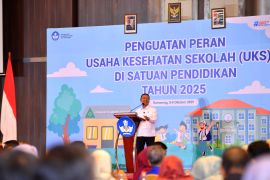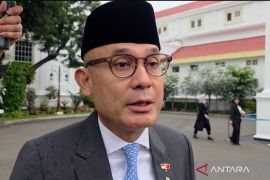Obesity in teenagers has become a problem in various parts of the world, with the World Health Organization (WHO) having declared it a global epidemic.
In Indonesia, 13.5 percent of adults aged 18 years and above are overweight, while 28.7 percent are obese, based on data from the Ministry of Health in 2018.
Obesity is suspected to be caused by an unbalanced diet among teenagers in Indonesia. Teen eating patterns, as depicted in the 2015 Global School Health Survey data, showed that 65.2 percent of teenagers did not always eat breakfast, 93.6 percent did not consume sufficient fruits or vegetable fiber, and 75.7 percent often consumed foods with flavor enhancers.
Moreover, 42.5 percent of teenagers tend to adopt a sedentary lifestyle with less physical activity.
In fact, obesity increases the risk of other dangerous diseases, including breathing difficulty, increased risk of bone fractures, hypertension, early markers of cardiovascular disease, insulin resistance, and psychological problems.
Sufferers also often experience anxiety, depression, lack of self-confidence, emotional problems, and issues related to bullying and social isolation, which affect the quality of life in teenagers.
Large-bodied teenagers are often mistreated in the wake of the phenomenon of fatphobia, sizeism, or discrimination against size.
This is unacceptable because body shaming has a negative impact on a person's quality of life.
In some cases, people with obesity are prone to experiencing eating disorders, such as anorexia and bulimia, to suppress their appetite in pursuit of a slim body.
In principle, obesity in teenagers can be prevented by adjusting eating patterns and portions, increasing fruit and vegetable consumption, engaging in physical activity, avoiding stress, and getting sufficient sleep.
On the other hand, it is also time for all elements of society to understand the importance of nutrition for health in every life cycle as it is a national investment, especially for the younger generation.
One such effort is made by the Community Service and Empowerment Team (PPM) from the University of Indonesia that focuses one of its activities on endeavors to reduce the risk of obesity in teenagers.
They realized that concrete steps were necessary to reduce the threat of obesity, including disseminating information in schools and empowering school health unit (UKS) cadres.
One such effort was disseminating information to UKS cadres at Tiara Nusa Vocational School, Depok City, and optimizing their role and function in improving obesity prevention behavior in teenagers.
This program is expected to be replicated by other schools to reduce the threat of obesity in teenagers with concrete and targeted behavior.
Related news: Media role crucial for shifting habits to tackle obesity: ministry
UKS Involvement
Obesity is a condition in which excess nutritional intake is not accompanied by an increase in physical activity, thereby resulting in the accumulation of body fat that is characterized by a calculated body mass index of above 27 kg/m2.
Data from the 2018 Basic Health Research Data showed that obesity among teenagers aged 16-18 years in Indonesia reached 4.5 percent. Meanwhile, the overall data on obesity sufferers in Depok City is relatively high, reaching 10.6 percent.
Handling obesity is not merely the government’s responsibility but also that of the family, schools, and health services.
Contribution at a school level can be carried out by training UKS cadres to provide better health services. Moreover, schools can collaborate with community health centers to promote healthy living behaviors for teenagers.
Meanwhile, the family can facilitate nutritional fulfillment and motivate teenagers to carry out regular physical activity.
UKS cadres must improve their skills in conducting obesity screening by measuring height and weight and calculating BMI correctly.
UKS cadres are volunteers tasked with providing basic health services to students at school.
They also have a strategic role in preventing obesity in teenagers, as they interact directly with all students and can provide education, motivation, and support in managing healthy eating patterns and increasing physical activity.
Hence, the PPM UI team initiated community service activities for UKS cadres at Tiara Nusa Vocational School, Depok City.
This activity includes education on the importance of maintaining body weight, basic skills training for UKS cadres, height and weight measurement, and calculating BMI. UKS cadres also learn to categorize nutritional status based on BMI calculations.
The expected benefits from this activity include increasing the knowledge, outlooks, and behavior of UKS cadres to prevent obesity; increasing the knowledge, outlooks, and behavior of students through cadres' mentoring to prevent obesity; becoming one of the management guidelines for preventing obesity in teenagers; and supporting SDGs achievement targets related to healthy and prosperous living.
This activity also involved speakers from various fields related to obesity prevention. This includes increasing motivation and awareness of healthy living for teenagers and demonstrating the GREW-DEAL innovation in preventing obesity.
In the future, greater concern and contribution from all elements of society will be paramount to improving public health, especially in preventing obesity in teenagers.
This is in line with various government efforts to reduce obesity rates, namely through the Healthy Living Community Movement (Germas) and the Nusantara Movement to Reduce Obesity Rates (Gentas).
However, the most effective step taken by far is conducting interventions to prevent obesity that focus on changing the lifestyle of individuals such as by increasing daily physical activity and improving the quality of diet by limiting excess calorie intake.
Related news: Regulate milk intake to prevent childhood obesity: Pediatrician
Related news: Govt to suppress obesity to 3 percent by 2030: Official
Translator: Hanni Sofia, Resinta Sulistiyandari
Editor: Yuni Arisandy Sinaga
Copyright © ANTARA 2024












